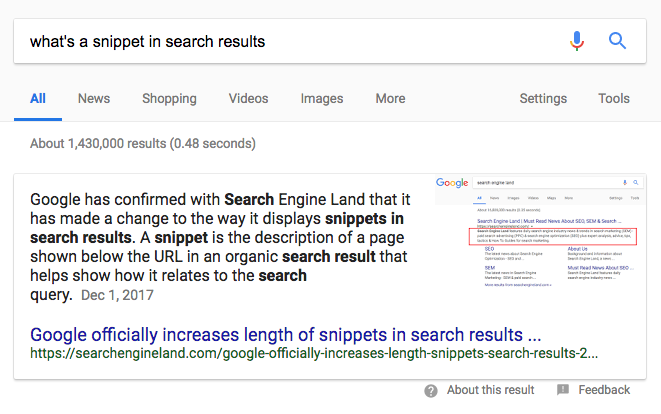
Surprise! Google Changed How Search Results Pages Appear Again
In the original version of this post, we told you about how the length of snippets was extended and how that affected your meta descriptions. Since that time, Google decided to ignore the time-honored playground rule of “no take backs,” and basically changed things back to the way they were before. We’ve updated this post to reflect that, and we’ve included a renewed explanation of why your meta descriptions still matter.
If you’ve ever worked with Google, you know that nothing stays the same for long. In December 2017, Google made the snippets on search results pages (SERPs) longer. The length went from 165 characters to a whopping 320. Then, in May 2018, they shortened them again to about where they were before.
When Google confirmed this change, they also said that there is no fixed length for snippets. Meaning that maybe this article was all just a waste of time?
But before we get too disheartened, there’s still some important information to go over. What’s a snippet? How does this affect what a meta description should contain? Great questions. Let’s start with a snippet.

If you don’t want to Google it, here’s a very meta example. Snippets are a paragraph of text within a web page, blog post, article, etc. that Google grabs and puts at the top of the search results page as a method of trying to give you the answer you’re looking for.
Google grabs this content from your page or your meta description. In the photo above, you can see that you get a pretty concise answer without having to click on the page to learn more, although it encourages you to.
Unfortunately, snippets may have a negative impact on click-through rates because if your content does show up in the snippet, it could be all people need, and if you’re not, users might be less inclined to scroll down the page to see other results because the snippet had the answer.
Understanding What a Meta Description Should Contain Will Help You Build a Better Website
How do these longer snippets affect how you write your meta descriptions? In the brief period where snippets could go up to 300 or more characters, it meant you could add more relevant content to help people understand what your page was about. Now that things have more or less gone back to the way they were, you essentially have the same amount of space as you did before.
As for how long it should be, Google says there is no limit. What determines the size of a snippet or meta description depends on the search query and the device the user is on. If you look through the SERP, you’ll also see that the length of individual meta descriptions varies based on the result.
Length aside, your meta descriptions are still important for two reasons. First, when Google creates snippets, it may use content from your meta description. Typically, it will use content from your actual page, but you want to make sure you have something there just in case.
The second reason is that while your meta descriptions won’t do anything to boost your SEO results, it will still encourage people to click on your page. It’s important that you have these as a way to tell people what they will find on your page, what they’ll learn about, what assets they’ll find, etc. A blank meta description will seem spammy, and if you just let it be the auto-generated text that Google places there, it might not be clear what your page is about.
You also don’t want to use duplicate meta descriptions on different pages across your site. This is a common problem because people don’t tend to think about what meta descriptions should contain while they’re building their site, but it can look awkward in search results.
If meta descriptions never mattered to you before, try giving them a little more respect. These chunks of text are going to help drive traffic to your site, so don’t copy and paste the first couple sentences out of the content you’ve written.
When you’re writing a meta description, the best thing to do is think about it like you’re selling someone you page. What does your audience care about in regards to your page? What’s going to make them want to learn more? Creating a short explanation of this that includes your keyword will allow you to optimize for snippets and provide your potential site visitor with a good experience.
If your page does end up getting pulled into a snippet at the top of the page, you’ll be glad that your content is written to be enticing, so you’re not missing out on the opportunity for new eyes on your website. As long as you’re providing succinct meta descriptions and helpful content, you’ll be readily prepared. Of course, that’s only if it changes again, but you can check back here for help if, and when, it does.

